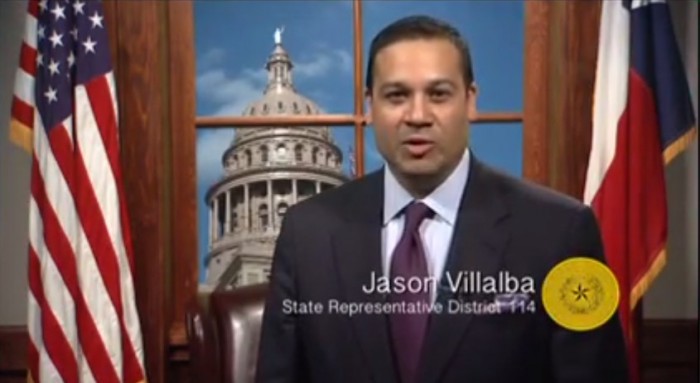
The Texas Representative Jason Villalba filed House Bill 2918 last week in Texas House of Representatives that attempts to criminalize any photographs, video, audio recording or other documenting of a police officer within 25 feet the officer.
I’ll cut right to chase and tell you that this bill is unconstitutional under the First Amendment of the United States Constitution. No questions asked. This is Constitutional Law 101. There is no way this bill could withstand a constitutional challenge in court.
The bill seeks to amend an existing Texas law that states in pertinent part:
(a) A person commits an offense if the person with criminal negligence interrupts, disrupts, impedes, or otherwise interferes with:
(1) a peace officer while the peace officer is performing a duty or exercising authority imposed or granted by law;
Texas Penal Code: Title 8, Chapter 38, Sec. 38.15
That sounds like a pretty fair law. If a police officer is doing his or her job, we don’t want people to interfere with a legitimate police issue.
The language of the proposed bill adds further specificity to Section 38.15(a)(1) as follows:
(f) . . . an interruption, disruption, impediment, or interference that occurs while a peace officer is performing a duty or exercising authority imposed or granted by law includes a person:
(1) filming, recording, photographing, or documenting the officer within 25 feet of the officer; or
(2) filming, recording, photographing, or documenting the officers within 100 feet of the officer while carrying a handgun under the authority of Subchapter H, Chapter 411, Government Code.
Note that the new subsection defines what is a criminally negligent interference. The new Subsection (f)(1) does not say you have to interfere AND film or photograph to be a criminal. It says all filming and photographing is interference.
The bill goes on to carve out certain exceptions for traditional news media but offers no leniency on the general populous.
Examples of Constitutionally Protected Photography/Video
So this law says that any scenario in which a person records police and is within a arbitrary distance of 25 feet from that officer has then committed a crime in Texas.
If you are riding a motorcycle with a GoPro on your helmet and are pulled over by police, you have committed a crime by continuing to record. Heck, you’ve probably committed a crime as they stopped you because you can’t get your GoPro to stop recording in time.
If you are in your car and have a dash camera rolling as you pass a police officer, you are a criminal in Texas according to this bill.
Or, how about a violent arrest is occurring on the sidewalk outside of a restaurant. You are inside the restaurant on the other side of the window about 15 feet away filming the incident with your iPhone. Under this proposed Texas law, you can be convicted of a Class A Misdemeanor and serve up to one year in jail and be forced to pay to a $4000 fine.
Even the incidental recording of police from 24 feet away is criminalize. Take one step back and the same activity is legal.
There are infinite possibilities in which you can conduct this First Amendment protected activity and not be interfering with police; however, you are still committing a crime under this bill.
Legal Precedent Says It is Unconstitutional
Were this bill to become law, it would be ripe for a facial challenge as substantially overbroad due to its restriction of speech-related activity under the First Amendment. That’s a hard bar to overcome in court; however, this proposed law is so broad that it rises to the occasion.
In the Glik case in 2011 (what I immediately thought of when I read this moronic bill), the First Circuit Court of Appeals held that any citizen has the same rights as journalists under the First Amendment to record police officers in a public place. In that case, a Boston man recorded the police as they made a public arrest and was charged under Maryland’s wiretapping law. Boston ended up settling with the man for $170,000.
The big holding from the Glik case is worth repeating here:
The First Amendment right to gather news is, as the Court has often noted, not one that inures solely to the benefit of the news media; rather, the public’s right of access to information is coextensive with that of the press. (my emphasis)
Admittedly, (for you law geeks out there) the First Circuit’s holding is not binding precedent on the Fifth Circuit; however, the basic tenants of the First Amendment are so fundamental to the Glik holding, there is virtually no way that any circuit could disagree with that holding. In fact in 2012, the Seventh Circuit, citing the Glik case as persuasive, ordered the district court to enjoin the State of Illinois from enforcing a similar wiretapping law (something I said would happen before it happened).
Those wiretapping laws are valid on their face; however, the way the police were trying to enforce them is what led to the courts’ rulings against the government.
This Texas bill is so broad and arbitrary, there are so many more ways that it infringes on the First Amendment than how it could support any legitimate government activity.
Mark my words. If this bill passes, it will eventually be struck down as unconstitutional.
Perhaps the worst part of all of this is that the bill’s sponsor, Representative Jason Villalba, is a practicing attorney. Again, this is what you learn in the first semester of Constitutional Law in law school. He had to pass that class to graduate law school. This bill is so overreaching that I am simply in awe that it was sponsored by an attorney. I guess someone always has to argue for the losing side though…
If you live in Texas and care about how your state is being governed, I urge you to call your state representatives and let them know just how poorly this bill represents Texas and the freedom of its people.
[via PetaPixel]


Wanna make book that the next law they try to pass is that you can’t photograph a politician — from any distance?
We already know that photographers are all terrorists, so I’m not surprised. I saw this on https://www.facebook.com/photographyisnotacrime
At first, I thought it was not cool, then I thought, it makes sense, to give the cops some room to work. When the police are dealing with an unknown situation, the last thing they need is to worry about people nearby, not knowing if they’re just observing, or about to jump in.
But reading this post, and the part about “a violent arrest is occurring on the sidewalk outside of a restaurant. You are inside the restaurant on the other side of the window”, it makes sense as well. There’s no reason to get in trouble for something like that. But you can also be naked in your own house, and someone walking down the sidewalk, looking in your window could have you arrested, so you’re not safe anywhere near a window, no matter what!
It would be nice if we lived in a world with less paranoia, with fewer people trying to provoke cops, and fewer cops making knee-jerk reactions to things that don’t really seem to be life-and-death situations. It’s a tough call. I’ve been in the middle of a huge standoff between 500+ NYPD and a crowd of 4000 angry people. When the cops asked me to get on the sidewalk, I listened, and had no problems. I continued recording video the whole time, and didn’t have any interest in provoking anything.
Sadly, the Constitution doesn’t seem to hold much sway with the current, and previous, batch of legislators. I see this law as an opportunity for the few bad apples in the constabulary to continue to abuse their authority; and a great excuse for me to get a longer lens.
Ha!
I love that you see the silver lining as a reason to get a longer lens. Way to look on the bright side!
…and for video/audio, get a parabolic mic, before they become illegal too!
It’s a Bill, not a law. It’s doubtful that it will ever make far enough to be a law…
Politicians create bills all the time (even ones they know they can’t get passed) to garner political favor from some groups. I wouldn’t be too concerned.
Maybe its simply on the zero accountability wish list. I shudder to imagine how much this will end up costing tax payers by the time its dealt with.